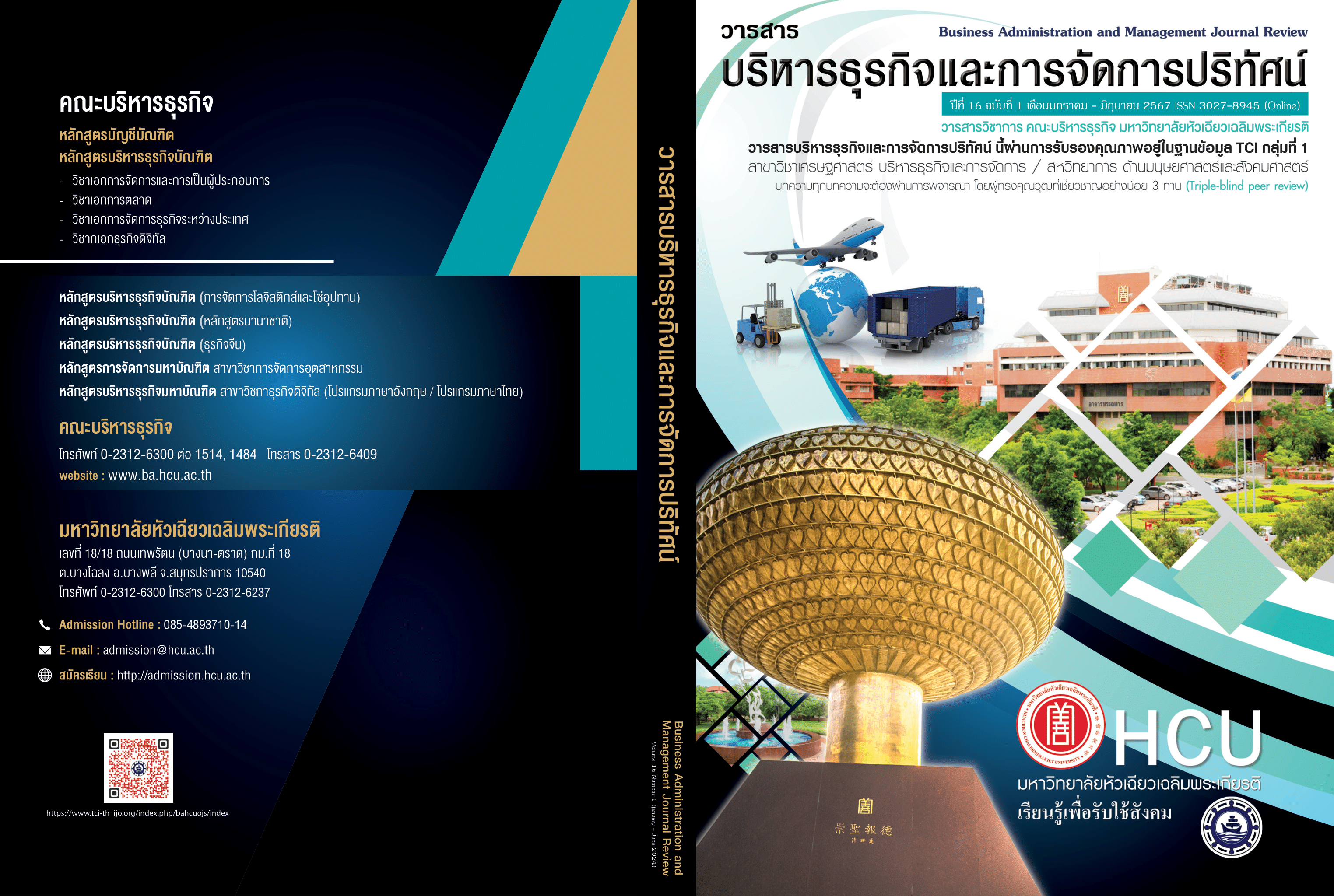Factors Affecting Environmentally Friendly Purchasing Behavior of Kasetsart University Students
Keywords:
Environmentally friendly purchasing behavior, Green products knowledge, Green marketing, Social influence, Environmental concernAbstract
The purpose of this research was to study the factors affecting the environmentally friendly purchasing behavior of students in Kasetsart University. Data were collected from 1,192 students by questionnaires. Statistical used for data analysis were percentage, mean, standard deviation, and stepwise multiple regression analysis. The results revealed that the factors influencing environmentally friendly purchasing behavior of students in Kasetsart University were environmental concern, social influence: society, university and friends, green marketing: place, and green products knowledge which could jointly predict the
environmentally friendly purchasing behavior up to 27.9 percent at the .05 significance level.
And all of these variables have a positive influence environmentally friendly buying behavior.
References
กรมควบคุมมลพิษ กระทรวงทรัพยากรธรรมชาติและสิ่งแวดล้อม. (2549). คู่มือการจัดซื้อจัดจ้างสินค้าและบริการที่เป็นมิตรต่อสิ่งแวดล้อม. กรุงเทพฯ: สถาบันสิ่งแวดล้อมไทย.
กรมควบคุมมลพิษ กระทรวงทรัพยากรธรรมชาติและสิ่งแวดล้อม. (2561). คู่มือการจัดซื้อจัดจ้างสินค้าและบริการที่เป็นมิตรต่อสิ่งแวดล้อม พ.ศ. 2561: วิธีการจัดซื้อจัดจ้างสินค้าและบริการที่เป็นมิตรต่อสิ่งแวดล้อม ฉบับปรับปรุง กุมภาพันธ์ 2561. กรุงเทพฯ: สถาบันสิ่งแวดล้อมไทย.
กรมส่งเสริมคุณภาพสิ่งแวดล้อม กระทรวงทรัพยากรธรรมชาติและสิ่งแวดล้อม. (2562). ความรู้เรื่องสิ่งแวดล้อม. สืบค้นเมื่อ 29 พฤศจิกายน 2562, จาก www.deqp.go.th/knowledge.
กรัณย์พัฒน์ อิ่มประเสริฐ และ อมรา รัตตากร. (2559). แนวคิดการตลาดสีเขียวเพื่อสังคมและสิ่งแวดล้อม. วารสารมหาวิทยาลัยราชภัฏธนบุรี, 10(2): 134-143.
กองแผนงาน มหาวิทยาลัยเกษตรศาสตร์. (2563). ข้อมูลนิสิตทั้งหมด ปีการศึกษา 2562. สืบค้นเมื่อ 12 กุมภาพันธ์ 2563, จาก https://web.planning.ku.ac.th/index.php/mnginfo/2018-01-23-06-37-45/stat.
ข่าวไทยพีบีเอส. (2562). เช้านี้ กทม.-ปริมณฑล ฝุ่น PM 2.5 เริ่มกระทบสุขภาพ 13 พื้นที่. สืบค้นเมื่อ 29 พฤศจิกายน 2562, จาก news.thaipbs.or.th/content/284661.
แคมปัส สตาร์. (2561). ผลการจัดอันดับ มหาวิทยาลัยสีเขียวโลก 2018: มหิดล-เกษตรฯ-จุฬาฯ ติดท็อป 100 อันดับแรก. สืบค้นเมื่อ 25 พฤศจิกายน 2562, จาก campus.campus-star.com/variety/92824.html.
ณิชา ทองเจริญ และ พัชรา ตันติประภา. (2558). ส่วนประสมการตลาดที่มีผลต่อผู้บริโภคเจนเนอเรชั่นวายในอำเภอเมืองเชียงใหม่ในการซื้อผลิตภัณฑ์ที่เป็นมิตรต่อสิ่งแวดล้อม. วารสารบริหารธุรกิจ มหาวิทยาลัยเชียงใหม่, 1(2): 1-20.
ธนิดา ภูศรี และ ชนม์ณัฐชา กังวานศุภพันธ์. (2563). พฤติกรรมการซื้อข้าวอินทรีย์ของผู้บริโภคในเขตเทศบาลเมือง จังหวัดสุรินทร์. วารสารวิจัยวิทยาการจัดการ มหาวิทยาลัยราชภัฏสุรินทร์, 4(1): 1-13.
นัฏฐิกานต์ อัศวมงคลพันธุ์ และ บุญญรัตน์ สัมพันธ์วัฒนชัย. (2561). การตลาดผ่านเครือข่ายสังคมออนไลน์ที่ส่งผลต่อการตัดสินใจซื้อเครื่องสำอางออร์แกนิกของผู้บริโภคในเขตกรุงเทพมหานคร. วารสารวิทยาลัยดุสิตธานี, 12(3): 397-413.
นันฑริกา เครือสา และ พัชร์หทัย จารุทวีผลนุกูล. (2563). พฤติกรรมการซื้อสินค้าและปัจจัยส่วนประสมทางการตลาดที่ส่งผลต่อการตัดสินใจซื้อผลิตภัณฑ์ดูแลผวแบรนด์ เดอ ลีฟ ของลูกค้าในกรุงเทพมหานคร. การประชุมนำเสนอผลงานวิจัยระดับบัณฑิตศึกษาครั้งที่ 15 ปีการศึกษา 2563, 15(2563): 206-220.
ปุณชญา ใจภักดี และ นภวรรณ นติเวชกุล. (2562). ความใส่ใจสิ่งแวดล้อมและพฤติกรรมผู้บริโภคต่อตราสินค้าเพื่อสิ่งแวดล้อมของเจเนอเรชั่นวาย. วารสารวิชาการมนุษยศาสตร์และสังคมศาสตร์ มหาวิทยาลัยบูรพา, 27(55): 83-109.
ปุณรดา ถาวรจิระอังกูร. (2558). อิทธิพลกลุ่มอ้างอิงที่มีผลต่อการตัดสินใจซื้อโทรศัพท์เคลื่อนที่แบบสมาร์ทโฟนของนิสิตมหาวิทยาลัยเกษตรศาสตร์. เศรษฐศาสตรมหาบัณฑิต, มหาวิทยาลัยเกษตรศาสตร์.
ภาวิณี ทองแย้ม. (2561). รูปแบบความสัมพันธ์เชิงสาเหตุของปัจจัยที่ส่งผลต่อการพัฒนาการตลาดสีเขียวและการตลาดเพื่อสิ่งแวดล้อมของผู้บริโภคจังหวัดจันทบุรี. วารสารวิทยาการจัดการสมัยใหม่, 11(2): 107-124.
วาโร เพ็งสวัสดิ์. (2553). สถิติประยุกต์สำหรับการวิจัยทางสังคมศาสตร์. กรุงเทพฯ: สุวีริยาสาส์น.
สันทนา อมรไชย. (2552). ผลิตภัณฑ์สีเขียวเพื่อสิ่งแวดล้อมที่ยั่งยืน. วารสารกรมวิทยาศาสตร์บริการ, 57(179): 29-36.
สำนักงานนโยบายและแผนทรัพยากรธรรมชาติและสิ่งแวดล้อม กระทรวงทรัพยากรธรรมชาติและสิ่งแวดล้อม. (มปป). แผนจัดการคุณภาพสิ่งแวดล้อม พ.ศ. 2560 – 2564. สืบค้นเมื่อ 28 พฤศจิกายน 2562, จาก eppo.go.th/index.php/th/plan-policy/climatechange/thailand/eqmplan.
Albayrak, T., Aksoy, S., & Caber, M. (2012). The Effect of Environmental Concern and Scepticism on Green Purchase Behaviour. Marketing Intelligence & Planning, 31(1): 27-39.
American Marketing Association. (2019). Definitions of Marketing. Retrieved November 26, 2019, from www.ama.org/the-definition-of-marketing-what-is-marketing/.
Bertrandias, L. & Elgaaied-Gambier, L. (2014). Others’ Environmental Concern as a Social Determinant of Green Buying, Journal of ConsumerMarketing. 31(6/7), 417–429.
Franssan, N. & Gärling, T. (1999). Environmental Concern: Conceptual Deffinitions, Measurement Methods, and Research Findings. Journal of Environmental Psychology 19: 369-382.
Goldsmith, E. B. (2015). Social Influence and Sustainable Consumption. Switzerland: Springer International Publishing.
Hessami, H. Z. & Yousefi, P. (2013). Investigation of Major Factors Influencing Green Purchasing Behavior: Interactive Approach. European Online Journal of Natural and Social Sciences, 2(4): 584-596.
Hoyer, W. D. & MacInnis, D. J. (2010). Consumer Behavior. 5th ed. United States of America: Harcourt College.
Joshi, Y. & Rahman, Z. (2015). Factors Affecting Green Purchase Behaviour and Future Research Directions. International Strategic Management Review, 3: 128-143.
Khaniwale, M. (2015). Consumer Buying Behavior. International Journal of Innovation and Scientific Research, 14(2): 278-286.
Kim, Y. & Choi, S.R. (2005). Antecedents of Green Purchase Behaviour: An Examination of Collectivism, Environmental Concern and PCE. Advances in Consumer Research, 32(1): 592-599.
Lee, K. (2009). Gender Differences in Hong Kong Adolescent Consumers' Green Purchasing Behavior. Journal of Consumer Marketing, 26(2): 87-96.
Maichum, K., Parichatnon, S., & Peng, K. (2016). Application of the Extended Theory of Planned Behavior Model to Investigate Purchase Intention of Green Products among Thai Consumers. Sustainability, 8: 1-20.
Mostafa, M. (2007). Gender differences in Egyptian consumer’s green purchase behaviour: the effects of environmental knowledge, concern and attitude. International Journal of Consumer Studies, 31(3): 220–229.
Munthiu, M. C. (2009). The Buying Decision Process and Types of Buying Decision Behaviour. Sibiu Alma Mater University Journals, 2(4): 27-33.
Promotosh, B. & Sajedul, I. (2011). Young Consumers’ Purchase Intentions of Buying Green Products. Master Thesis in Umeå School of Business, Umeå University.
Schultz, D.P. & Schultz, S.E. (2010). Psychology and Work Today: An Introduction to Industrial and Organizational Psychology. 10th ed. New Jersy: Prentice Hall.
Soonthonsmai, V. (2001). Predicting Intention and Behavior to Purchase Environmentally Sound or Green Products among Thai Consumers: An Application of the Theory of Reasoned Action. Doctor of Philosophy Thesis in Business Administration, Nova Southeastern University.
Vazifehdoust, H, Taleghani, M., Esmaeilpour, F., Nazari, K. & Khadang, M. (2013). Purchasing Green to become Greener: Factors Influence Consumers’ Green Purchasing Behavior. Management Science Letters, 3: 2489–2500.
Wang, H., Ma, B., & Bai, R. (2019). How Does Green Product Knowledge Effectively Promote Green Purchase Intention?. Retrieved November 28, 2019, from www.mdpi.com/2071-1050/11/4/1193/htm.
Downloads
Published
How to Cite
Issue
Section
License
Copyright (c) 2024 Business Administration and Management Journal Review

This work is licensed under a Creative Commons Attribution-NonCommercial-NoDerivatives 4.0 International License.
All articles published in the Business Administration and Management Journal Review are copyrighted by the journal.
The views and opinions expressed in each article are solely those of the individual authors and do not represent those of Huachiew Chalermprakiet University or any other faculty members. Each author is fully responsible for the content of their own article. Any errors or issues found are the sole responsibility of the respective author.




